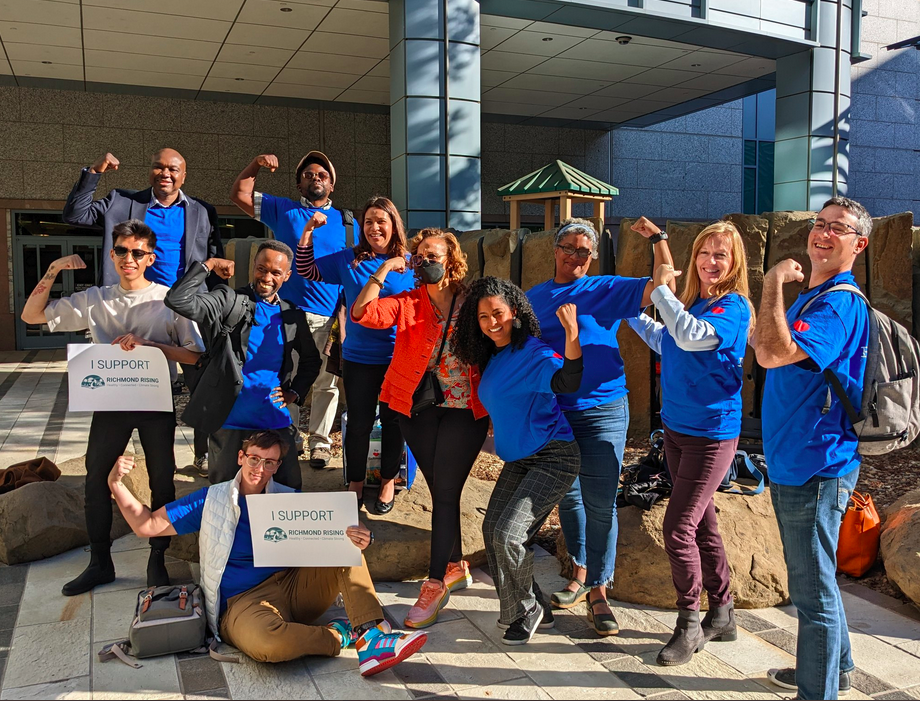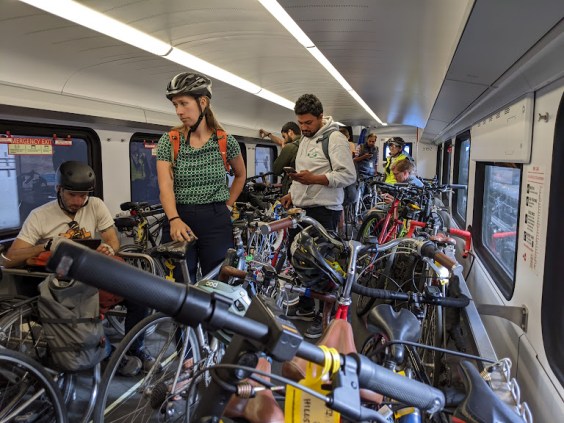Note: GJEL Accident Attorneys regularly sponsors coverage on Streetsblog San Francisco and Streetsblog California. Unless noted in the story, GJEL Accident Attorneys is not consulted for the content or editorial direction of the sponsored content.
California's Transformative Climate Community (TCC) grant program is, by all reports, highly successful at bringing people together to collaborate on climate solutions for their local areas. The program gives out planning grants - to jump-start the process - and implementation grants to help get projects off the ground.
Now in its fourth cycle, the program has been such a success that the state increased its funding with an injection of money from the general fund for this round. That made it possible for the Strategic Growth Council (SGC) to approve a total of seven planning grants and three implementation grants yesterday, with funds left over to provide more technical assistance in the next round.
That technical assistance is key, as attested to by numerous commenters at yesterday's SGC meeting. Not only is the application process complex and competitive, it requires a very broad community engagement process to allow area residents to decide for themselves what is most important and useful to them in terms of becoming climate resilient. That could be anything from better bike and pedestrian infrastructure to transit passes to solar rooftops to gardens to urban trees and more.
The total approved for the three implementation grants is about $94 million, and most of the seven planning grants come to about $300,000.
The winning applicants are rightfully celebrating today, as it took years-long efforts to get this funding, and many of them have already gone quite a ways towards creating the transformations these grants aim for.
That is also true of the applicants that came close, but did not win. Just starting a process to get people asking the question "How can we make our community better and what do we need to help make that happen?" can produce surprising results and momentum towards change, and towards asking for specific kinds of help.
Staff was reassuring that Round 5 funding will be available next year, and these applications have quite a leg up in the competition. They include a proposed implementation grant in the Coachella Valley, Prospera, to build a housing project, rooftop solar, an active transportation and a transit access project, and an urban greening project. Another honorary mention was a planning grant request from the San Francisco Transit Riders Union that was aimed at engaging people in the Bayview/Hunters Point neighborhood on their transportation needs and solutions, and floated the possibility of incorporating "quick build" projects to speed up transit and make streets safer.
These projects, and the winning ones listed below, all showed "strong community partnership and capacity to complete the projects." More detail on each project can be found in the staff reports [Implementation Grants PDF; Planning Grants PDF].
TCC Implementation Grants
- Community Partners: South L.A. Eco-Lab, $35 million
This project brings together twelve different community partners, among them Trust South LA, Strategic Actions for a Just Economy, Streets LA, LA Metro, LADOT, GRID Alternatives, and Tree People, to work on about eleven different projects focused on active transportation, access to transit, clean energy, increasing tree canopy, and avoiding displacement.
The partners received a planning grant in Round 2 of the TCC to begin a participatory planning process that identified "the need for increased resident engagement in land use decisions, expanded access to jobs that pay living and family-sustaining wages, increased affordable housing and parks, and improved air quality and transportation." The South LA Eco-Lab proposal will create green spaces, improve energy and water efficiency, expand safe travel options within the area.
- City of Richmond: Richmond Rising, $35 million
Partners on this grant include the City of Richmond, the Trust for Public Land, Rich City Rides, GRID Alternatives, Urban Tilth, and Groundwork Richmond. Projects will focus on neighborhood complete streets, the Richmond Wellness Trail, an e-bike lending library, community gardening, healthy food, and food security, renewable energy in homes, and reduction of water waste.
"Overall, Richmond Rising presents a strong vision for the Iron Triangle, Santa Fe, and Coronado neighborhoods informed by years of youth leadership, grassroots organizing, community engagement, and community planning. This vision is complemented by the applicant and co-applicants’ demonstrated capacity for executing the proposed plans and projects."
- City of Stockton: Stockton Rising, $24 million
Again, a long list of partners have been working together for years on a range of projects that include park renovation, workforce training, solar installations, urban forestry, and more. Stockton Rising received a partial implementation grant in the last funding cycle, and will further build on the work it has been doing. The community's focus is on transit access and mobility, renewable energy, water and energy efficiency, and indoor air quality.
TCC Planning Grants
- County of San Diego: Spring Valley Sustainable Environments & Engaged Development Strategies (SEEDS). Spring Valley is an environmental justice community that will focus on a community land trust study and healthy food systems, among other projects.
- Karuk Tribe: Panámnik, sákriiv nukyâavish! (Orleans, we are making it strong!). Community engagement and development planning for the unincorporated community of Orleans, to include housing, resilient clean energy, air quality, and food security.
- County of Monterey: Climate Prosperity for Pájaro Valley. Pájaro Valley is an unincorporated area near Watsonville, largely populated by farmworkers. This application will bring together a cross-sector community climate coalition to make recommendations on electrification, transportation, and affordable housing.
- Chicken Ranch Rancheria. Mi-Wuk tribal community members will focus planning efforts on "healthy and safe communities with equitable access to sustainable public health and development, including improving active transportation and identifying funding to better connect communities and Jamestown to sister communities in Tuolumne County."
- Allensworth Progressive Association. Planning will focus on a reimagined Civic Center/Plaza, a recreational trail, greenways, housing, and a community solar farm.
- Native American Environmental Protection Coalition. Members of the Hoopa Valley Indian Reservation will conduct a climate vulnerability and adaptation planning process, with the intent of encouraging community participation and decision-making so that Tribal members ‘own the plan’ and are vested and active in the outcome.
- Wiyot Tribe. Planning for mixed-use affordable housing in a walkable, ecologically restored neighborhood, prioritizing Wiyot tribal members, indigenous people, and low-income people, as well as developing well-paying construction jobs.
Note that several of the planning grants are in unincorporated and/or tribal areas, which became newly eligible for funding in this round. These grants will give the communities and tribes an opportunity to decide for themselves what projects and plans will be most beneficial to them, as well as give them the tools and financing to complete analyses of local policies and fiscal impacts.
At yesterday's meeting, several SGC councilmembers took a moment to express appreciation to all of the grant applicants, and admiration for the commitment and the time and effort that went into creating meaningful community engagement to create the best plans.
In particular, councilmember Frank Cardenas pointed out that this was South L.A.'s second attempt to win a TCC implementation grant. "In the face of what we know about climate change, it's easy to become despondent," he said, adding that he has been tempted to give in to that himself - but a site visit to the Eco-Lab changed his outlook. "This," he said, "makes me feel hopeful and optimistic. I think I see the future here."
"Richmond, Stockton, and South L.A. are all vestiges of the extractive economy," he added, and that needs to end. "There are problems in L.A. right now, but those politicos aren't real - this is real. These communities are real. This grant lets you come up with the vision; our job is to simply make sure that the resources - which you are already paying for - come back to you.
"It's been a long time, but you have earned it," he added.






